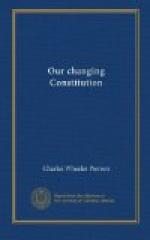[Footnote 1: 192 U.S., 397.]
Other illustrations of the same apparent confusion of thought are to be found in the opinion. For example, it is said (citing various cases involving a tax on business where the party taxed was a corporation):
We think it is the result of the cases heretofore decided in this Court, that such business activities, though exercised because of state-created franchises, are not beyond the taxing power of the United States.
Here again the Court seems to lose sight of the distinction between a tax on “business activities” and a tax on the privilege of conducting such activities in a corporate capacity.
It is futile, however, to quarrel with the logic of the opinion. The question is closed and the Court, by affirming the judgments appealed from, has committed itself to the theory that the Federal Government may, by taxation, burden the exercise of a privilege which only a state can confer. With the expediency of that theory as applied to present-day political conditions we are not now concerned. The object of this chapter is to point out that the decision marks a distinct departure from the earlier doctrine that the two sovereignties, federal and state, are upon an equality within their respective spheres.
In view of the centralizing forces which are tending to transform these sovereign states into mere political subdivisions of a nation, the decision is of great significance. Moreover, in a very practical way it touches the right of each state under the compact evidenced by the Federal Constitution to manage its internal affairs free from compulsion or interference by the other states. To illustrate: In some parts of the country the anti-corporation feeling runs high. Many men if given their way would tax the larger corporations out of existence. Under this decision the way is open whenever a majority can be secured in Congress. An increase in the tax rate is all that would be necessary. Make the rate ten per cent. or twenty per cent. instead of one per cent. and the thing is accomplished.
New York may deem it good policy to encourage the carrying on of industry in a corporate form. Texas may take a different view and conclude that the solution of the trust problem lies in suppressing certain classes of corporations altogether. Under this decision it lies within the power of Texas and her associates if sufficiently numerous to impose their view on New York and make it impossible for her domestic industries to be carried on profitably in a corporate form. And yet the possibility of impressing the will of one state or group of states upon another state with respect to her internal affairs is the very thing which the founders of the republic sought most carefully to avoid. Had it been understood in 1787 that the grant of taxing powers to the General Government involved such a curtailment of state independence, few states, in all probability, would have been ready to ratify the Constitution.




